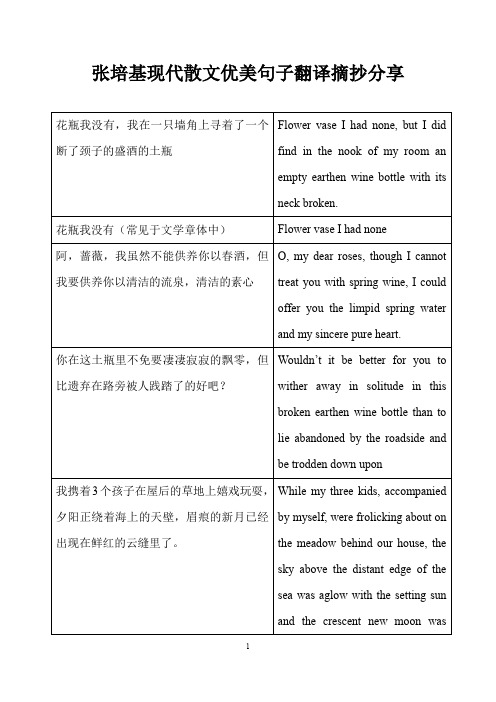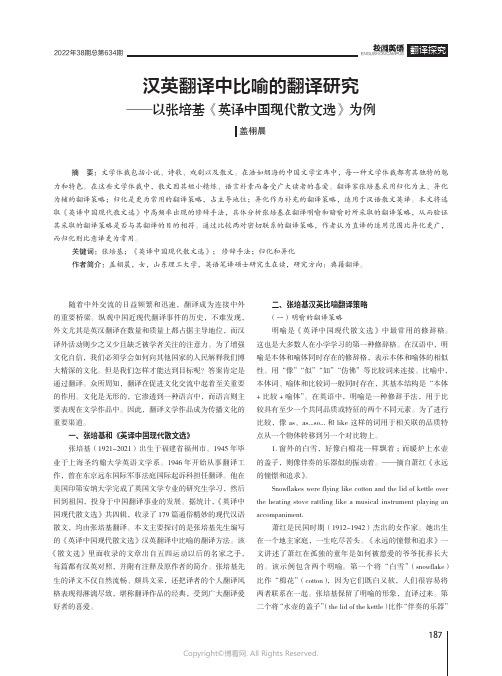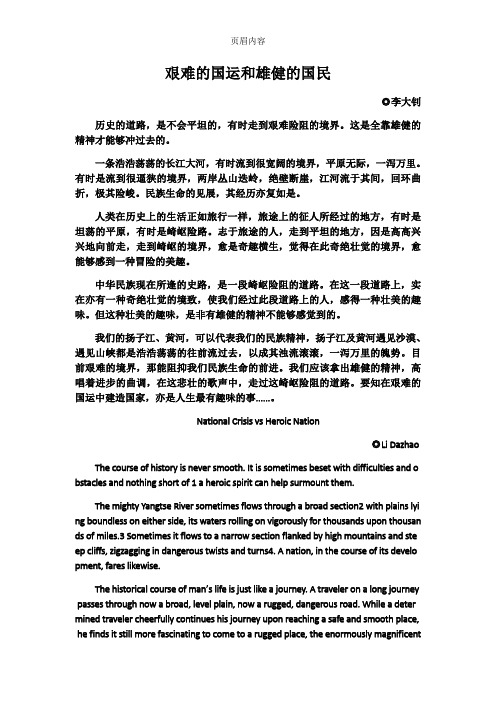张培基《英译中国现代散文选》句子仿写小结
张培基现代散文优美句子翻译摘抄分享

张培基现代散文优美句子翻译摘抄分享花瓶我没有,我在一只墙角上寻着了一个断了颈子的盛酒的土瓶Flower vase I had none, but I did find in the nook of my room an empty earthen wine bottle with its neck broken.花瓶我没有(常见于文学章体中)Flower vase I had none阿,蔷薇,我虽然不能供养你以春酒,但我要供养你以清洁的流泉,清洁的素心O, my dear roses, though I cannot treat you with spring wine, I could offer you the limpid spring water and my sincere pure heart.你在这土瓶里不免要凄凄寂寂的飘零,但比遗弃在路旁被人践踏了的好吧?Wouldn’t it be better for you to wither away in solitude in this broken earthen wine bottle than to lie abandoned by the roadside and be trodden down upon我携着3个孩子在屋后的草地上嬉戏玩耍,夕阳正绕着海上的天壁,眉痕的新月已经出现在鲜红的云缝里了。
While my three kids, accompanied by myself, were frolicking about on the meadow behind our house, the sky above the distant edge of the sea was aglow with the setting sun and the crescent new moon wasalready peeping out from behind the scarlet clouds草原中放牧着的几条黄牛,不时曳着悠长的鸣声,好像在叫他们的主人快来牵他们回去。
张培基《英译中国散文选》读书报告

张培基《英译中国散文选》读书报告从张培基《英译中国现代散文选》中探究翻译原理这学期我读了我国著名的翻译家—张培基先生的《英译中国现代散文选》。
书中每篇文章都是汉英对照,并对本文的写作背景、翻译方法、语言难点等都做了一些注解和解释,使得阅读难度降低,同时能提升读者的英语水平。
张老毕生追求“忠实、通顺”的翻译标准,这点我在阅读的过程中感受颇深。
例如,在《想北平》中,北平被译为Beiping,而不是Beijing,这是符合史实的,因为解放前,北京是叫北平的。
总体来说,张老在遣词造句方面构造简单、凝练,通俗易懂,灵活地运用翻译技巧,译文流畅流利,并未偏离散文“形散而神不散”的特点。
本次,我主要讲张老在翻译过程中使用的“归化”和“异化”的翻译策略。
在汉译英中,“异化”是指在翻译方法上迁就外来文化的特点,吸纳外语表达方式。
在夏丐尊《中年人的寂寞》中“真正的朋友,恐怕要算‘总角之交’或‘竹马之交’了”,张老就采用了异化的处理方法,译为“Real friendship between two persons originates perhaps from the time of life when they were children playing innocently together”.在汉语中,“总角之交”和“竹马之交”均指幼年时期就交好的朋友,此处张老就翻得贴近中国文化,迁就汉语的表达方式。
此外,“归化”指在翻译过程中恪守本民族文化的语言传统,回归地道的本族语表达方式。
在《差不多先生传》中,原文是“不上一点钟,差不多先生就一命呜呼了”,张老译为“Consequently, Mr. Cha Buduo kicked the bucket before an hour was out”. 在这里,张老将“一命呜呼”译为“kick the bucket”这一俗语,符合英语的表达习惯,对外国读者来说理解理解比较容易。
汉英翻译中比喻的翻译研究——以张培基《英译中国现代散文选》为例

ENGLISH ON CAMPUS2022年38期总第634期汉英翻译中比喻的翻译研究——以张培基《英译中国现代散文选》为例摘 要:文学体裁包括小说、诗歌、戏剧以及散文。
在浩如烟海的中国文学宝库中,每一种文学体裁都有其独特的魅力和特色。
在这些文学体裁中,散文因其短小精炼、语言朴素而备受广大读者的喜爱。
翻译家张培基采用归化为主、异化为辅的翻译策略;归化是更为常用的翻译策略,占主导地位;异化作为补充的翻译策略,适用于汉语散文英译。
本文将选取《英译中国现代散文选》中高频率出现的修辞手法,具体分析张培基在翻译明喻和暗喻时所采取的翻译策略,从而验证其采取的翻译策略是否与其翻译的目的相符。
通过比较两对密切联系的翻译策略,作者认为直译的适用范围比异化更广,而归化则比意译更为常用。
关键词:张培基;《英译中国现代散文选》; 修辞手法;归化和异化作者简介:盖栩晨,女,山东理工大学,英语笔译硕士研究生在读,研究方向:典籍翻译。
随着中外交流的日益频繁和迅速,翻译成为连接中外的重要桥梁。
纵观中国近现代翻译事件的历史,不难发现,外文尤其是英汉翻译在数量和质量上都占据主导地位,而汉译外活动则少之又少且缺乏被学者关注的注意力。
为了增强文化自信,我们必须学会如何向其他国家的人民解释我们博大精深的文化。
但是我们怎样才能达到目标呢?答案肯定是通过翻译。
众所周知,翻译在促进文化交流中起着至关重要的作用。
文化是无形的,它渗透到一种语言中,而语言则主要表现在文学作品中。
因此,翻译文学作品成为传播文化的重要渠道。
一、张培基和《英译中国现代散文选》张培基(1921-2021)出生于福建省福州市。
1945年毕业于上海圣约翰大学英语文学系。
1946年开始从事翻译工作,曾在东京远东国际军事法庭国际起诉科担任翻译。
他在美国印第安纳大学完成了英国文学专业的研究生学习,然后回到祖国,投身于中国翻译事业的发展。
据统计,《英译中国现代散文选》共四辑,收录了179篇通俗精妙的现代汉语散文,均由张培基翻译。
张培基译注的《英译中国现代散文选》技巧赏析

张培基译注的《英译中国现代散文选》技巧赏析
中国现代散文,作为中国文学史上一种重要的文体,一直备受读者的喜爱。
出版商早已着手准备将中国现代散文译成英文,以便能够让国外读者更好地了解中国文学。
2005年,张培基教授出版的《英译中国现代散文选》便获得了成功。
故事的主人公历经了艰辛的翻译过程,进而体验到中国现代散文的自然美和字句的优美。
《英译中国现代散文选》主要是由张培基教授,以及尤西娜、杨福林、吴健、陈庆铭等知名译者共同完成的。
其收集的文字非常丰富,包括鲁迅、茅盾、冰心、苏轼等著名作家的散文作品。
其中,以茅盾的《面孔》最为著名,故事描述了他在西藏拜访仓央嘉措时近距离接触到佛陀的神圣面容,而荡然无存的内心感受。
这首散文被英文译者译作“The Face”,凸现出中国文学的深厚内涵,极具文学艺术性。
另一方面,《英译中国现代散文选》也体现出译者的技巧。
在翻译过程中,译者需要注意把握文学艺术效果,以及保留具有民族特色的文字,同时又不失原文的精髓,这是一个很考验译者技巧和艺术水准的过程。
在该译注书中,张培基教授与其合作者们充分发挥出自己的翻译技巧,通过注释把中国文学的历史背景及文化涵义融入其中,使故事更加灵活有趣,更容易理解,令读者在阅读时得到更多的收获。
本书也体现了最新的翻译理论和实践,如陈乃恒的“功能翻译理论”、坎特利的“失去翻译理论”等,从宏观角度让读者了解更多翻
译的技巧,以及翻译过程中可能出现的问题。
总之,《英译中国现代散文选》不仅深入浅出地把中国现代散文介绍给国外读者,而且也给我们以翻译的精湛技术、美妙的文学艺术感受,可以说是一部开拓性的让中国文学走向世界的译注书籍,受到了许多读者和译者的广泛好评。
论在汉译英中主语的选择 ——以张培基《英译中国现代散文选》为例

论在汉译英中主语的选择——以张培基《英译中国现代散文选》为例摘要翻译是两种语言间相互转换的语言活动。
在汉译英中,我们面临的任务之一是选择合适的词做主语。
然而,由于英汉语言间存在较大差异,我们在汉译英过程中选择主语并不容易。
汉英主语在形式和构句方面存在差异,而且汉语注重话题而英语注重主语。
本文从对这些差异的分析入手,通过对张培基《英译中国现代散文选》的学习以及本人自身的实践和总结,在汉译英主语选择方面提出了一些方法和建议。
一、保留原文主语作译文主语,二、选择原文的其他句子成分作译文主语,三、在译文中增补主语,四、减少改变主语。
进而得出结论。
在汉译英选择主语时,我们应该现在英美人的思维方式上考虑,结合英语的语言习惯,充分理解原文,运用一些技巧选择合适的主语。
关键词:汉译英;主语的选择;英汉主语的差异;张培基;英译中国现代散文选AbstractTranslation is a language activity of transforming between two languages. In the process of Chinese-English translation, choosing the suitable words as subjects is one of the tasks people facing with. However, it's not easy for people to choose subjects in Chinese-English translation because of the differences between Chinese and English. The subjects of Chinese and English have differences in forms and sentence structure. Furthermore, Chinese is topic-prominent language and English is subject-prominent language. This thesis begins with these differences, puts up some methods and advises about how to choose a suitable subjects through learning Selected Modern Chinese Essays by Zhang Peiji and the author own practices and conclusion. First, keeping the subjects of the original sentences. Second, choosing other constituents of the original sentences. Third, replenishing new subjects for the translation. Fourth, reducing of changing the subjects. And then, the writer shows the conclusion that it should be considered the mode of thinking in western countries, combining with the English language habits, fully understanding the origin text, and use some skills to choose the appropriate subjects.Key words: Chinese-English Translation;the choice of subjects;the differences of subjects in English and Chinese;Zhang Peiji;Selected Modern Chinese EssaysContentsAbstract (I)1.Literature Review 01.1 Existing Researches on this Topic 01.2 Purposes and importance of the study 02. Differences between Chinese and English Subjects (1)2.1 In Forms (1)2.2 Topic-prominent Language vs. Subject-prominent Language12.3 In Sentence Structure (2)3. Methods of Choosing the Subjects in Chinese-English Translation 23.1 Keep the Subjects of the Original Sentences (3)3.2 Choose other constituents of the Original Sentences (3)3.2.1 Choose the Objects to be the Subjects (4)3.2.2 Choose the Adverbials to be the Subjects (4)3.2.3 Choose the Attributives to be the Subjects (6)3.2.4 Choose the Predicates to be the Subjects (6)3.3 Replenish New Subjects for the Translation (6)3.3.1 Replenish the Suppressed Subjects of the Original .. 73.3.2 Replenish the Impersonal Pronoun “It” (7)3.4 Reduce of Changing the Subjects (8)4. Conclusion (9)Bibliography (10)Acknowledgements (10)1.Literature Review1.1 Existing Researches on this TopicMany scholars discussed the translation of Chinese and English sentences from the perspective of differences between Chinese and English subjects. According to the existing research, there are many different forms of expression between Chinese and English, which can be divided into topic-prominent language and subject-prominent language, covert subject and overt subject, parataxis and hypotaxis in sentence structure, personal subject and impersonal subject. These studies focus on the analysis of subjective differences between Chinese and English languages, but the discussion of subjects in Chinese-English translation is relatively less detailed. In the book Chinese-English Translation Studies and Practice written by Ji Dequan (2005: 105), who puts forward five principles of determining the subjects in Chinese-English translation: "(1) It must conform to the English expression and the background. (2) It must conform to the English way of thinking ". (3) It must be the information that should be emphasized in the sentence. (4) It must follow the logical order of the sentence. (5) It should meet the context of the request ". In addition, Liu Miqing (1992: 37:46) has concluded in his book Contrast and Translation of English and Chinese three specific methods of selecting the subjects in the procession of translating Chinese into English, which are equivalence, shift, and supplement. These studies provide translators with some theories, principles, and strategies to choose the subject of Chinese to English translation.1.2 Purposes and importance of the StudyThe main purposes and importance of my paper can be summarized as the following two aspects. First of all, as a famous translator and translation theorist, Zhang Peiji made a great contribution to the translation of Chinese papers. The qualities and standards of the articles which he translated are very high. His Selected Modem Chinese Essays was widely accepted by readers and scholars to help spread the Chinese culture, so his translation of the paper worthy of translators’ unremitting study, they learned a lot, so as to improve translators’ ability to translate; the other aspect is that there is no denying the important role of the subject in shaping and constructing sentences in both Chinese and English. They also have a significant impact on the cohesion of sentences,but because of the differences between English and Chinese subjects, translators choose an appropriate subject from Chinese into English as a challenge, so it seems that it should be investigated and made detailed use of some useful translation techniques and strategies to help translators’ determine the subject of Chinese to English translation. Zhang Peiji's Chinese prose translation has set a good example in choosing the appropriate subject, so the author chose to analyze own translation works together with him and explore the method of choosing the subject.2.Differences between Chinese and English SubjectsChinese and English belong to two different language families, therefore Chinese finds its root in the Sino-Tibetan Language Family, while English belongs to Indo-European Language Family. Differences exist between the two languages, one of which is the difference between their subjects, so as bring difficulties to us in English learning and Chinese and English translation. This chapter will generally discuss the differences between Chinese and English subjects mainly in the following three facts.2.1 In FormsChinese subjects are diverse and highly compatible. Wei Zhicheng (2003) points out that all kinds of words, phrases and clauses can be used as Chinese subject. Liu Miqing (1992) argues that, due to the diversity of Chinese characteristics, the Chinese language features, almost any form of expression can be directly used as the subject of Chinese, or in other words, topics, such as nouns, verbs, adjectives, quantifiers or any other words, phrases or terms, we consider them to be "topics" rather than "subjects". “TmS (time subject), PlS (place subject), DaS (subject matter), MrS (modifier subject) Chinese subject” (Liu Meiqing, 1992: 39). Unlike Chinese subjects, English subjects are less incompatible and form singular, because they must be nominal. Thus, noun and subject pronouns can be used as subject of English, and as for other non-nominal words, phrases or clauses, if you want to use them as subjects of English, you must change their form and make them nouns.2.2 Topic-prominent Language vs. Subject-prominent LanguageAccording to Li and Thompson (1976) theory, different languages can be divided into four categories, namely the subject-prominent language, thetopic-prominent language, both the subject-prominent and the topic-prominent language, neither the subject-prominent nor the topic-prominent language. And they show that Chinese belongs to the topic-prominent language which is the informational units of topic and comment that are basic to the structure of sentences, while English is the subject-prominent language which is the grammatical units of the subject and predicate that are basic to the structure of sentences. English focuses more on the relationship between the subject and the actor and the action, and the performance of the behavior can be found in the close grammatical relationship between the English subject and the predicate. This is not the same as Chinese. Zhao Yuanren (1979) said that only about 50% of the relationship between the Chinese subject and the predicate reflects the relationship between the actor and the behavior, so it is best to be the Chinese subject and predicate as the topic and comment. This also explains why Chinese subjects are more diverse than English subjects.2.3 In Sentence StructureFrom the above discussion, you can conclude that that English emphasizes the subject. They are indispensable in constructing sentences. In most cases, the subject is the starting point, the center and the must in English sentences. Often using the formal subject "it" can also be a good explanation of the English subject is indispensable. They have a decisive grammatical function and have a comprehensive and close relationship with the whole sentence. In English, the subject decides the number of predicates, so it should be consistent with the subject when the sentence is constructed. “The main body and the predicate form the seven main English sentences, namely SV, SVC, SVO, SVA, SVOO, SVOC, SVOA.” (Quirk, R., Greenbaum, G. Leech & J. Svartvik, 1985: 721). These forms of sentences also reveal the importance of English subjects. Chinese sentences are more flexible and do not have to follow strict sentences as English. As for the Chinese subject, they are not indispensable in the sentence structure and are not related to the form of the predicate. No subject sentences are common to meet in Chinese, and in many cases the subject can be omitted.3.Methods of Choosing the Subjects in Chinese-English Translation3.1 Keep the Subjects of the Original SentencesFrom the analysis and discussion in section two, translators understand that the subject of English sentences is mainly nouns, subjective pronouns or nominal words. If the original Chinese has a clear subject, and the subject is composed of nouns or subjective pronouns, and in line with the English primitive order, which is the thematic progression pattern. And then the translation of the original subject can be used as the subject of English translation. This is the easiest and most reliable means of choosing a subject in Chinese to English translation.(1)这激流永远动荡着,并不曾有一个时候停止过,而且它也不能够停止;没有什么东西可以阻止它。
张培基译注的《英译中国现代散文选》技巧赏析

张培基译注的《英译中国现代散文选》技巧赏析张培基教授于1979年出版的《英译中国现代散文选》一书,是以翻译的视角来反思中国文学的重要研究成果。
本书以中国现代散文诗歌为研究对象,尽管语言地域不同,但他们都能够运用语言的特征和独有的文艺表达能力来抒发诗人的情感。
张培基教授对那些文学翻译的技巧有着深入研究和深刻理解。
他在探索中英文字面译义、文体翻译技巧以及文章翻译技巧方面做出了杰出贡献。
首先,研究中英文字面译义或言语习惯比较是张培基译注的翻译实践中比较重要的一个步骤。
他在翻译中英文时,努力保持原文语义的完整性,在翻译中保留原文的重点与强调,在汉译中尽量保留汉语的流畅性和美感,同时译文也应保持原文的精神气息与灵魂。
其次,张培基在文体翻译方面的技巧也非常出色。
他的文体翻译技巧主要体现在:尊重原文的文体特征,积极把握不同文体的不同表达能力,将中国古代文学样式融入现代文体,结合译者的个人风格,使原文诗歌表达的抒情性与现代文章和译文相结合。
此外,张培基教授在文章翻译技巧方面也有着很高的水准。
他的翻译技巧主要表现在:他掌握了有效的翻译策略,如:把原文分解并再组合、灵活性运用文学词汇和言辞形式,以及具有自我特色的笔触等;他运用了中英翻译技巧,如:多样化的文体翻译、词语翻译、句子翻译等;他还使用了多种翻译策略,如:直译、意译、引用、释义、搭配等,这些翻译策略使翻译更具有节奏感和艺术质感,并且能够把原文的意义融汇在一起。
总的来说,张培基教授在《英译中国现代散文选》一书的翻译实践中,他之所以能够取得这样的翻译成果,是因为他在中英文字面译义、文体翻译技巧以及文章翻译技巧方面都投入了大量的精力,并且掌握了有效的翻译技巧,有效地结合了中英文字面意义以及文化背景,从而实现了原文与译文的艺术完美结合。
张培基教授的翻译技巧不仅受到了专家学者的一致好评,也得到了读者的追捧,被誉为文学翻译领域的佼佼者。
以上,就是张培基译注《英译中国现代散文选》一书技巧赏析的全部内容。
从《英译中国现代散文选》的译文看张培基的翻译理念

从《英译中国现代散文选》的译文看张培基的翻译理念作者:陈振云来源:《时代文学·下半月》2010年第10期一、引言张培基先生是我国著名的翻译家,他的散文翻译忠实、凝炼,在力求选词得当、语句自然流畅的同时又不拘泥于计较词句上的得失,而是把语篇神韵摆在第一位,追求既能完美地表达原文信息、原文功能、又能译出原文的风格与韵味,充分体现了他毕生追求的“忠实、通顺”的翻译理念。
他在《英译中国现代散文选》中的译作涵盖了五四运动以来相当一部分优秀的散文作品,不仅为中国学者深入研究翻译理论与技巧提供了典型实例文章,而且为外国学者研究中国五四以来知识分子的思想发展提供了大量的素材。
二、张培基“忠实通顺”的翻译理念及异曲同工的国外翻译理论张培基先生提出可用“忠实、通顺”四个字作为翻译标准。
忠实不但指忠实于原作的内容,还指保持原作的风格。
通顺指译文语言必须通顺易懂、流畅地道。
如果不考虑表达是否通顺,只注重内容的忠实,常会导致译文失去原作风采甚至使读者看不懂;另一方面,如果牺牲内容而追求表达方式的华丽,则无法传达原文信息。
二者都不能说是完美的翻译。
在不能兼而有之的情况下,译者应首先照顾忠实的要求。
国内外持这种观点的大有人在,例如,德国翻译的“科学论”者赖斯在与弗米尔合作的《翻译理论基本原理》一书中也同样强调译文与原文“意图”的一致性(即“忠实”)。
法国著名翻译理论家安帕罗·于塔多·阿尔比也提出:忠实的目标自然应该是翻译主体的意义。
他认为“在重新表达中的确存在着一定的自由度,但是要想忠实于意义,译者也必须服从重新表达这一层面所必须服从的某些限制,因为它只能使用那些可以清楚正确的为目的语读者表达同样意义的手段在”。
但是忠实是不容易做到的,对此,功能派的奠基性理论——翻译目的论的创立者弗米尔提出了三个法则:目的法则、连贯性法则和忠实性法则。
他强调从功能的动态性对等来解释翻译:翻译不是一种语言的词句到另一种语言的解码,而是一种非常复杂的行为方式:译者将原语文本的信息在新的、改变了功能、文化、语言的条件下复制,同时尽可能地保留原语的形式。
张培基:英译中国现代散文选1学习笔记之【艰难的国运和雄健的国民-李大钊】

艰难的国运和雄健的国民◎李大钊历史的道路,是不会平坦的,有时走到艰难险阻的境界。
这是全靠雄健的精神才能够冲过去的。
一条浩浩荡荡的长江大河,有时流到很宽阔的境界,平原无际,一泻万里。
有时是流到很逼狭的境界,两岸丛山迭岭,绝壁断崖,江河流于其间,回环曲折,极其险峻。
民族生命的见展,其经历亦复如是。
人类在历史上的生活正如旅行一样,旅途上的征人所经过的地方,有时是坦荡的平原,有时是崎岖险路。
志于旅途的人,走到平坦的地方,因是高高兴兴地向前走,走到崎岖的境界,愈是奇趣横生,觉得在此奇绝壮觉的境界,愈能够感到一种冒险的美趣。
中华民族现在所逢的史路,是一段崎岖险阻的道路。
在这一段道路上,实在亦有一种奇绝壮觉的境致,使我们经过此段道路上的人,感得一种壮美的趣味。
但这种壮美的趣味,是非有雄健的精神不能够感觉到的。
我们的扬子江、黄河,可以代表我们的民族精神,扬子江及黄河遇见沙漠、遇见山峡都是浩浩荡荡的往前流过去,以成其浊流滚滚,一泻万里的魄势。
目前艰难的境界,那能阻抑我们民族生命的前进。
我们应该拿出雄健的精神,高唱着进步的曲调,在这悲壮的歌声中,走过这崎岖险阻的道路。
要知在艰难的国运中建造国家,亦是人生最有趣味的事......。
National Crisis vs Heroic Nation◎Li DazhaoThe course of history is never smooth.It is sometimes beset with difficulties and o bstacles and nothing short of1a heroic spirit can help surmount them.The mighty Yangtse River sometimes flows through a broad section2with plains lyi ng boundless on either side,its waters rolling on vigorously for thousands upon thousan ds of miles.3Sometimes it flows to a narrow section flanked by high mountains and ste ep cliffs,zigzagging in dangerous twists and turns4.A nation,in the course of its develo pment,fares likewise.The historical course of man’s life is just like a journey.A traveler on a long journey passes through now a broad,level plain,now a rugged,dangerous road.While a deter mined traveler cheerfully continues his journey upon reaching a safe and smooth place, he finds it still more fascinating to come to a rugged place,the enormously magnificentspectacle of which,he feels,is better able to generate in him a wonderful sensation of adventure.The Chinese nation is now confronted with a rugged and dangerous section of its historical course.There is also in this section a spectacle of enormous magnificenc e that inspires in us passers-by a delightful sensation of splendor.And this delightful sen sation,however,can only be shared by those with a heroic spirit.The Yangtze River and the Yellow River are both symbolic of our national spirit.The two mighty rivers negotiate5deserts and gorges until6their turbid torrents surge forw ard with irresistible force.The present national crisis can never obstruct the advance of our national life.Let us brace up our spirits and march through this rugged,dangerous r oad to the tune of our solemn,stirring songs.The greatest joy of life,mind you,7is to b uild up our country during its most difficult days….李大钊(1888-1927)此原文载1923年12月20日《新国民》第1卷第2号,短小隽永,堪称一首诗意盎然的抒情散文诗。
- 1、下载文档前请自行甄别文档内容的完整性,平台不提供额外的编辑、内容补充、找答案等附加服务。
- 2、"仅部分预览"的文档,不可在线预览部分如存在完整性等问题,可反馈申请退款(可完整预览的文档不适用该条件!)。
- 3、如文档侵犯您的权益,请联系客服反馈,我们会尽快为您处理(人工客服工作时间:9:00-18:30)。
微博 @
..比...更能满足...的需要:It seems that...can better satisfy ....than.... 仿写: 经典文化比通俗文化更能满足人民群众的需要。 It seems that classical culture can better satisfy the demands of people than popular culture.
It was not until I left home that I began to realize the meaning of old saying,A mother always worries about her son while he is thousand miles away from home. 6)然则只要竖起天线,捕捉乐观的信号,你就有望在八十高龄告别尘寰时仍觉得年轻 As long as your aerials are up, to catch waves of optimism, there’s hope you may die young at 80. 提炼: As long as+从句,there is sth.
张培基《英译中国现代散文选》仿写
主语从句/it 做形式主语类 1)后来忽然有人发明了一个方法,就是把植物的种子放在要解剖的头盖骨里,给它以温度 与湿度,使它发芽。 It so happened that, at the suggestion of someone, some seeds of plant were placed inside a human skull awaiting dissection before heat and moisture were applied to cause them to grow. 提炼: It so happens that 碰巧发生某事,so 表强调,说明事情发生的偶然程度。 仿写: 事情就是这么巧,我和他生日同一天。 It so happens that we have the same birthday. 注:句中“将…未…”的表达较好 2)像苏东坡说的“月出于东山之上,徘徊于斗牛之间”,完全是我无法想象的。 It was beyond my wildest dream to understand what the poet Su Dongpo said in his poem: "The moon rises above the Eastern Mountain and lingers between the Southern Dipper and Altair." 提炼: It was beyond my wildest dream to do … 仿写: 成为著名小说家,完全是我无法想象的。 It was beyond my wildest dream to become a famous novelist. 3)而且我这样大年纪的人,难道还不能料理自己吗? Besides, it was certainly no problem for a person of my age to look after himself. 提炼: 对于我这样年纪的人来说,...是没问题的:it is certainly no problem for a person of my age to do sth. 仿写: 我已经 20 岁了,对于我这样年纪的人来说独自外出旅行是没有问题的。 I am already 20,it is certainly no problem for a person of my age to travel alone 4)要坐轮船坐飞机,自然也有办法. It stands to reason that I can go by steamer or aircraft if I care to. 提炼: .....也是合情合理的/也是自然的: It stands to reason that ..... 仿写: 显然,如果你通情达理,对人友善,纳闷你肯定会获得多回报 It stands to reason that if you are considerate and friendly to people you will get a lot more back. 5)对你来说,这不算什么;可对我来说,却可以减轻不少负担。
when I heard…,it was like…. 仿写: 听见这个坏消息,如同一把刀插进了心里。 When I heard this bad news, it was like a dagger stuck in my heart. 3)它只把果子埋在地底,等到成熟,才容人把它挖出来。 It does not show itself until you dig it out when it is ripe. 提炼:not...until+从句 仿写:她一直等到女儿回来才去睡觉。 She didn’t go to bed until her daughter came back. 4)只有在我过度劳累的时候,在我长时间不间断地工作的时侯,在我感到内心空虚、需要充 实的时候,我才会感到寂寞。 I am lonely only when I am overtired, when I have worked too long without a break, when for the time being I feel empty and need filling up. 提炼: 主句+ only when +从句 仿写: 只有在忙碌过后来个小憩我才会感到满足。 I feel satisfied only when I have a snap after busy work. 5)这好处我到了离学校以后才知道。 It was not until I had already left school that I began to realize this advantage. 提炼:直到.....某人才意识到....: It was not until....that sb began to realize 仿写:离家之时才理解了“儿行千里母担忧”。
微博 @鬼谷一喵
2
张培基《英译中国现代散文选》仿写
仿写: 只要不放弃,就有希望。 As long as you don’t give up, there is hope. 7)就吾弟个人而言,可谓忠孝两全。 as far as you yourself are concerned, this will be an expression of both loyalty and filial piety. 提炼: As far as sb. be concerned,…… 仿写: 就我而言,他们很反对它。 As far as i am concerned, they are strongly against it. 8)你想孩子小时不教育,长大能好得了?! You see, if a child is not brought up properly from infancy, you cannot expect him to grow up in the right way, can you? 提炼: If ..., you cannot expect sb. to do sth. 仿写: 若你不守信,你的朋友会相信你?! If you do not keep faith, you cannot expect your friends to trust you, can you? 9)主人得价疾行,待我城西二十里大树下。 As soon as you get the money, get away from here quickly and wait for me under a big tree about twenty R west of town. 提炼: As soon as+状从 仿写: 他一做完课堂作业,就跑出了教室。 As soon as he finishes his classwork, he runs out of the class. 10)方便是方便,可就是没有一样是你们自己的。 Though they make your life easy and comfortable, none of them belongs to you in the rest sense of the word. 提炼:Though ... 仿写:Though the outside world is in chaos, you can have your own peace. 11)在喧嚣的日子,在钢筋棍凝土的单元里,守着一坛平静的心情,酝酿着古老而纯朴的乡 下味道. Amid the hustle and bustle of our everyday life and in the apartment of reinforced concrete, the pot stood there by itself, brewing an old and simple flavor. 提炼: 在....中间 :Amid ... 仿写 Amidthe hustle and bustle of our everyday life, she lives a peaceful life. 12)母亲突然大笑起来,笑着笑着,流出了一脸泪。我和妻子也流了泪。 Mother burst into laughter, and then into tears, as my wife and I shared with her all her sorrow and joy. 提炼: 伴随/也:as...
状语从句类 1)隔了这么久,恐怕连谢罪自谴的有效期也早过了吧。 The reply has been delayed for so long that I'm afraid even a heartfelt apology has already lost its power. 提炼: So…that… 仿写: 这里人太多,我找不到她。 There are so many people that I can’t find her. 2)接着听见了它有力的鸣声,如同一个巨大的心的呼号 And when I heard its piercing cry, it was like a terrible cry from the heart. 提炼:
